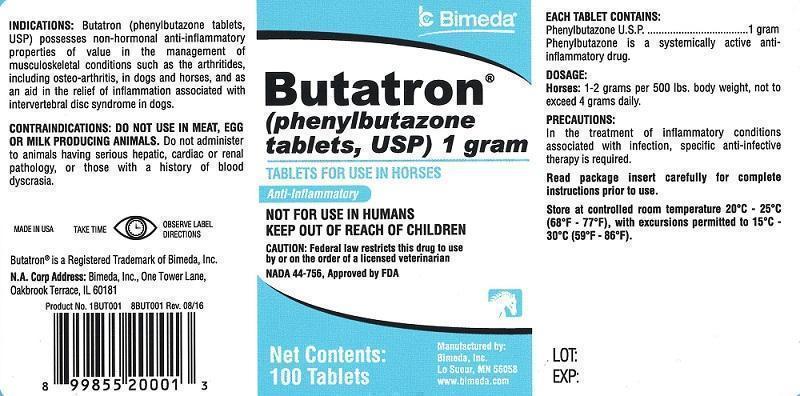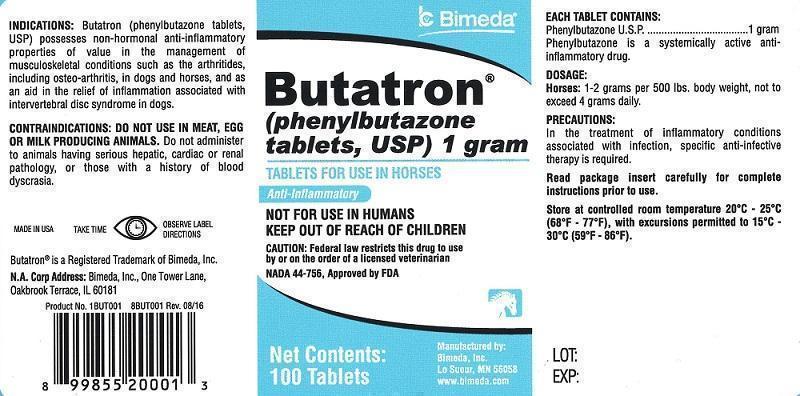Label: BUTATRON- phenylbutazone tablet
- NDC Code(s): 61133-5700-2
- Packager: Bimeda, Inc.
- Category: PRESCRIPTION ANIMAL DRUG LABEL
Drug Label Information
Updated November 28, 2018
If you are a healthcare professional or from the pharmaceutical industry please visit this version.
- Download DRUG LABEL INFO: PDF XML
- Official Label (Printer Friendly)
- DESCRIPTION
- GENERAL PRECAUTIONS
-
INDICATIONS & USAGE
ACTIONS AND USES:
Kuzell (1,2,3), Payne(4), Flemming(5) and Denko(6), demonstrated clinical effectiveness of phenylbutazone in acute rheumatism, gout, gouty arthritis and various other rheumatoid diseases in man. Anti-inflammatory activity has been well established by Fabre(7), Domenjoz(8), Wilhelmi(9), and Yourish(10).
Lieberman(11) reported on the effective use of phenylbutazone in the treatment of conditions of the musculoskeletal system in dogs, including posterior paralysis associated with intervertebral disc syndrome, fractures, arthritis and injuries to the limbs and joints. Joshua(12) observed objective improvement without toxicity following long-term therapy of two aged arthritic dogs. Ogilvie and Sutter(13) reported rapid response to phenylbutazone therapy in a review of 19 clinical cases including posterior paralysis, posterior weakness, arthritis, rheumatism and other conditions associated with lameness and musculoskeletal weakness.
Camberos(14) reported faborable results with phenylbutazone folowing intermittent treatment of thoroughbred horses for arthritis and chronic arthrosis (e.g. osteoarthritis of medial and distal bones of the hock, arthritis of the stifle and hip, arthrosis of the spine and generalized arthritis). Results were less favorable in cases of traumatism, muscle rupture, strains and inflammatory conditions of the third phalanx. Sutter(15) reported favorable responses in chronic equine arthritis, fair results in a severely bruised mare, and poor results in two cases where the condition was limited to the third phalanx.
INDICATIONS:
Phenylbutazone possesses non-hormonal, anti-inflammatory activity of value in the management of musculoskeletal conditions in dogs and horses such as the arthritides, including osteoarthritis, and as an aid in the relief of inflammation associated with intervertebral disc syndrome in dogs.
- CONTRAINDICATIONS
-
WARNINGS AND PRECAUTIONS
WARNING: PHENYLBUTAZONE SHOULD NOT BE ADMINISTERED TO MEAT, EGG OR MILK PRODUCING ANIMALS BECAUSE THE STATUS OF RESIDUES OF DRUG REMAINING IN EDIBLE TISSUES HAS NOT BEEN DETERMINED.
HAZARDS AND PRECAUTIONS: 1. Use with caution in animals with a history of drug allergy.
2. Stop medication at the first sign of gastrointestinal upset, jaundice or blood dyscrasia. Authenticated cases of agranulocytosis associated with phenylbutazone have occurred in man. Phenylbutazone induced blood dyscrasias have been reported in dogs. Thrombocytopenia and leukopenia are early manifestations followed by nonregenerative anemia. The occurrence of this reaction is not dose dependent and is unpredictable. To guard against this possibility, conduct routine blood counts at not more than 7 day intervals during the early course of therapy, and at intervals of not more than 14 days throughout the course of therapy. Any significant fall in the total white count, relative decrease in granulocytes or black or tarry stools should be regarded as a signal for immediate cessation of therapy and institution of appropriate treatment.
3. When treating inflammatory conditions associated with infection, specific anti-infective therapy is required.
4. Response to phenylbutazone therapy is prompt, usually occurring within 24 hours. If no significant clinical response is evident after 5 days of therapy, re-evaluate diagnosis and therapeutic regimen. -
DOSAGE & ADMINISTRATION
DOSAGE - DOGS:
ORALLY20 mg per pound body weight (100 mg/5 lbs.) daily in 3 divided doses, not to exceed 800 mg daily regardless of body weight.
DOSAGE - HORSES:
ORALLY1-2 grams per 500 lbs. body weight, not to exceed 4 grams daily.
ADMINISTRATION:
1. Use a relatively high dose for the first 48 hours, then reduce gradually to a maintenance dose. Maintain lowest dose capable of producing the desired clinical response.2. In many cases tablets may be crushed and given with feed. Reduce the dosage as symptoms regress. In some cases treatment may be given only when symptoms appear with no need for continuous medication.
3. In animals, phenylbutazone is largely metabolized in 8 hours. It is recommended that a third of the daily dose be administered at 8 hour intervals.
4. Many chronic conditions will respond to phenylbutazone therapy but discontinuance of treatment may result in the recurrence of symptoms.
- STORAGE AND HANDLING
-
HOW SUPPLIED
HOW SUPPLIED:
BUTATRON (Phenylbutazone Tablets, U.S.P.) are supplied in the following tablet concentrations and package sizes:
100 mg tablets..........................................................Bottles of 1000 tablets
1 gram tablets...........................................................Bottles of 100 tablets
-
REFERENCES
1. Kuzell, W.C., Schaffarzick, R.W., Naugler, W.G., Mankle, E.A., A.M.A. Arch. Int. Med. 92:646, 1953.
2. Kuzell, W.C., Schaffarzick, R.W., Brown, B., Mankle, E.A., Jour. Amer. Med. Assoc. 149:729, 1952.
3. Kuzell, W.C., Schaffarzick, R.W., Cal. Med. 77:319, 1952.
4. Payne, R.W., Shetlar, M.R., Farr, C., Hellbaum, A.A., and Ishmael, W.K.T., J. Lab. Clin. Med. 45:331, 1955.
5. Flemming, J. and Will, G., Ann. Rheumat. Dis. 12:95, 1953.
6. Denko, C.W., Ruml, D., Amer. Practit. 6:1865, 1955.
7. Fabre, J. and Berger, A., Semaine Hop. (Paris) 31:87, 1955.
8. Domenjoz, R., Theobald, W. and Morsdorf, K., Arzneimittel-Forsch. 5:488, 1955.
9. Wilhelmi, G. and Pulver, R., Arzneimittel-Forsch. 5:221, 1955.
10. Yourish, N., Paton, B., Brodie, B.B. and Burns, J.J., A.M.A. Arch. Ophth. 53:264, 1955.
11. Lieberman, L.L., Jour. A.V.M.A. 125:128, 1954.
12. Joshua, J.O., Vet. Rec. 68:60 (Jan 21), 1956.
13. Ogilvie, F.B. and Sutter, M.B., Vet. Med 52:492 - 494, 1957.
14. Camberos, H.R., Rev. Med Vet. (Buenos Aires) 38:9, 1956.
15. Sutter, M.D., Vet. Med. 58:83 (Feb.), 1958.
- WARNINGS
- PRINCIPAL DISPLAY PANEL
-
INGREDIENTS AND APPEARANCE
BUTATRON
phenylbutazone tabletProduct Information Product Type PRESCRIPTION ANIMAL DRUG Item Code (Source) NDC:61133-5700 Route of Administration ORAL Active Ingredient/Active Moiety Ingredient Name Basis of Strength Strength Phenylbutazone (UNII: GN5P7K3T8S) (Phenylbutazone - UNII:GN5P7K3T8S) Phenylbutazone 1 g in 3.027 g Product Characteristics Color white Score no score Shape ROUND Size 24mm Flavor Imprint Code NA Contains Packaging # Item Code Package Description Marketing Start Date Marketing End Date 1 NDC:61133-5700-2 100 g in 1 BOTTLE Marketing Information Marketing Category Application Number or Monograph Citation Marketing Start Date Marketing End Date NADA NADA044756 12/17/1976 Labeler - Bimeda, Inc. (060492923) Registrant - Bimeda, Inc. (060492923) Establishment Name Address ID/FEI Business Operations Bimeda, Inc. 060492923 manufacture


